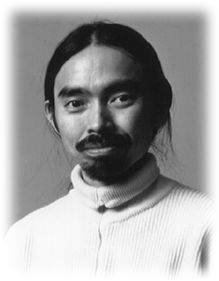
|
|
 |
|
Director Ku Na'uka Theatre Company |
| Profile of Satoshi Miyagi |
|
Born in 1959, in Kanda, Tokyo. Studied aesthetics at Tokyo University. Had a strong interest in Rakugo (japanese comic talk) since his teens. In 1980, he created a performance group at university and started his career as a director as well as an actor. In this period, he developed a unique training method for actors, based on oriental gymnastics. In 1986, he started performing solo, basing his work on modern novels. These shows were praised as "the birth of new clown art, founded upon a concrete story telling technique with an element of dance" He took part, as an actor, in Se-wori-chotta directed by Lee Yuntaek, a Korean director, and toured Korea, the U.S.A. and Japan. In 1990, he founded a new theatre company "Ku Na'uka" with the "two actors play one role" method thanks to the discovery of young talents. In 1993, Ku Na'uka was invited to Toga Festival and has been presenting a new production on the occasion of Toga spring festival since 1995. In 1995, for the first edition of Theatre Olympics in Delphi, he presented Elektra with the Suzuki Company of Toga and Tadashi Suzuki in which the leading role was played by Mikari, a brilliant actress from Ku Na'uka, touring Copenhagen, Stockholm, Beijing and Shanghai. Since 1996, the company has been venturing into the realm of japanese classical pieces, of which Tenshu-Monogatari, the fantastic piece by Kyoka Izumi, has been highly successful with audiences and toured many cities in Japan, India, Pakistan. In 1999, Satoshi Miyagi presented Chushin-gura, the play written for Bunraku and Kabuki, for the 2nd edition of Theatre Olympics, which had been held in Shizuoka. |
| He is also: |
| •member
of group P4 of japanese directors, (Yukikazu Kano, Oriza Hirata, Satoshi
Miyagi, Masahiro Yasuda) •head of the International Department of Theater Interaction -Japan-, •secretary generale of BeSeTo (Beijing, Seoul, Tokyo) Theatre Festival, •guest director of SPAC (Shizuoka Performing Arts Center ; managed by Tadashi Suzuki) |